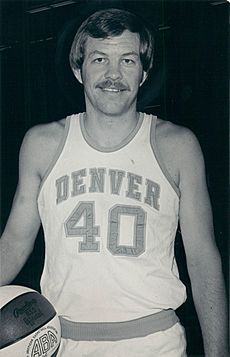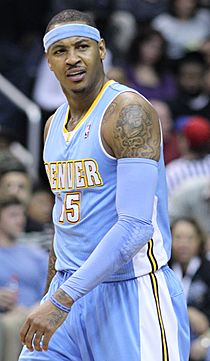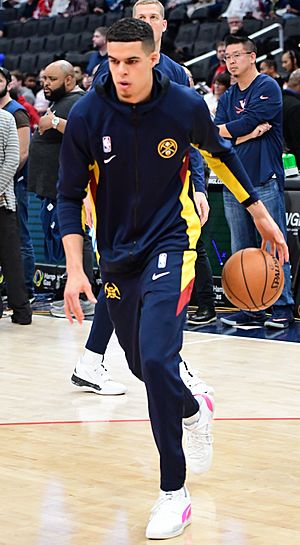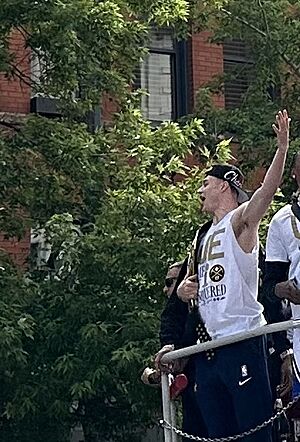Denver Nuggets facts for kids
Quick facts for kids Denver Nuggets |
|||||
|---|---|---|---|---|---|
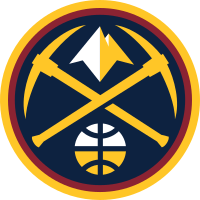 |
|||||
| Conference | Western | ||||
| Division | Northwest | ||||
| Founded | 1967 | ||||
| History | Denver Rockets 1967–1974 (ABA) Denver Nuggets 1974–1976 (ABA) 1976–present (NBA) |
||||
| Arena | Ball Arena | ||||
| Location | Denver, Colorado | ||||
| Team colors | Midnight blue, sunshine yellow, Flatirons red, skyline blue |
||||
| Main sponsor | Ibotta | ||||
| CEO | Josh Kroenke | ||||
| President | Josh Kroenke | ||||
| General manager | Ben Tenzer (interim) | ||||
| Head coach | David Adelman | ||||
| Ownership | Kroenke Sports & Entertainment (Stan Kroenke, Owner/Governor) | ||||
| Affiliation(s) | Grand Rapids Gold | ||||
| Championships | 1 (2023) | ||||
| Conference titles | 1 (2023) | ||||
| Division titles | 12 ABA: 2 (1970, 1975) NBA: 10 (1977, 1978, 1985, 1988, 2006, 2009, 2010, 2019, 2020, 2023) |
||||
| Retired numbers | 7 (2, 12, 33, 40, 44, 55, 432) | ||||
|
|||||
The Denver Nuggets are a professional basketball team from Denver, Colorado. They play in the National Basketball Association (NBA) as part of the Western Conference's Northwest Division. The team started in 1967 as the Denver Larks in the American Basketball Association (ABA).
They quickly changed their name to the Rockets before their first season. In 1974, they became the Nuggets. This was to prepare for a possible move to the NBA. In 1976, the Nuggets played in the last ABA Championship, but lost to the New York Nets.
The team has had many successful periods. They joined the NBA in 1976 after the ABA and NBA merged. In 2023, led by stars Nikola Jokić and Jamal Murray, the Nuggets won their first NBA championship. They were the last of the four former ABA teams to reach the NBA Finals. The Nuggets play their home games at Ball Arena in Denver.
Contents
- Team History
- Starting the Team in 1967
- The ABA Years (1967–1976)
- Early NBA Years (1976–1982)
- The Alex English Era (1982–1989)
- A Period of Decline (1989–1991)
- The Dikembe Mutombo Era (1991–1996)
- Another Period of Struggle (1996–2003)
- The Carmelo Anthony Era (2003–2011)
- Post-Carmelo Anthony Era (2011–2015)
- The Nikola Jokić Era and First NBA Championship (2015–Present)
- Recent Season Records
- Home Courts
- Team Colors, Logos, and Uniforms
- Team Mascot
- Retired Numbers
- Basketball Hall of Famers
- See also
Team History
Starting the Team in 1967
The team began in 1967 as one of the first teams in the American Basketball Association (ABA). The original owner couldn't find a good arena in Kansas City. So, the league suggested moving the team to Denver.
The team was first called the Denver Larks. But the owners didn't have enough money. Just before the first game, a Denver trucking owner named Bill Ringsby bought most of the team. He quickly renamed them the Rockets, after his company's trucks.
The ABA Years (1967–1976)
The Denver Rockets played at the Denver Auditorium Arena. They were successful early on and gained many fans. However, they often lost in the playoffs and only reached the ABA championship once.
Early stars included Byron Beck and Larry Jones. Lonnie Wright also played for the team. He was the first player to play professional football and basketball in the same season. In the 1969–70 season, Spencer Haywood joined the team. He was one of the first players to turn pro before finishing college. Haywood was named ABA MVP and Rookie of the Year. The team won their division but lost in the playoffs.
Haywood left for the NBA in 1970. This led to a famous court case that changed rules for young players joining pro leagues. After he left, the team's performance dropped.
Becoming the Denver Nuggets (1974–1976)
In 1972, Bill Ringsby sold the team. In 1974, the team decided to change its name. They planned to move to the NBA, and another team was already called the Rockets. They held a contest, and "Nuggets" was chosen. This name honored an older Denver basketball team from the 1940s. Their new logo showed a miner finding a basketball.
The Nuggets got much stronger with new players like David Thompson, Marvin Webster, Dan Issel, and Bobby Jones. With Larry Brown as coach, they had their best seasons. In 1974–75, they won 65 games. In 1975–76, they won 60 games and reached the ABA Finals. They lost to the New York Nets. After that season, the ABA and NBA merged. The Nuggets, Nets, Indiana Pacers, and San Antonio Spurs joined the NBA.
Early NBA Years (1976–1982)
The Nuggets continued to play well in the NBA. They won division titles in their first two seasons. However, they didn't have much success in the playoffs. Joining the NBA also came with high costs, including a $2 million entry fee.
In 1979, Coach Brown left, and the team struggled for a bit. In 1981, Doug Moe became the head coach. He brought a "motion offense" style, which focused on moving the ball until a player was open to shoot. Moe's teams scored a lot of points. In the 1981–82 season, they scored at least 100 points in every game. They also set an NBA record for the highest points per game average at 126.5 points.
The Alex English Era (1982–1989)
With star players like Alex English and Kiki Vandeweghe, the Nuggets led the league in scoring. English and Vandeweghe both averaged over 25 points per game. In 1983, the Nuggets and the Detroit Pistons played a game where they scored a combined 370 points, an NBA record. English won the NBA scoring title that season.
In 1984–85, the Nuggets reached the Western Conference Finals but lost to the Los Angeles Lakers. Before that season, Vandeweghe was traded for Fat Lever, Calvin Natt, and Wayne Cooper. With English leading the way, the team continued to be strong. In 1987–88, they won 54 games, their most as an NBA team. However, they lost in the playoffs.
A Period of Decline (1989–1991)
Doug Moe left the team in 1990. The new coach, Paul Westhead, also liked a fast-paced "run and gun" style. But with older players leaving, the team struggled. They went from a good record to winning only 20 games in 1990–91.
The Dikembe Mutombo Era (1991–1996)
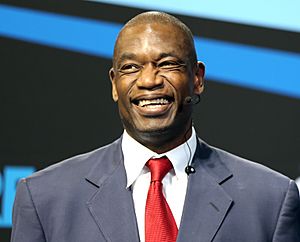
The Nuggets started rebuilding by drafting Dikembe Mutombo in 1991. Mutombo was a great shot-blocker. In 1992, Dan Issel became the coach. The team also drafted LaPhonso Ellis and Bryant Stith.
In 1993–94, the Nuggets changed their team colors to navy blue, metallic gold, and maroon. Led by Mutombo, Mahmoud Abdul-Rauf, and Ellis, they had a winning season. They made the playoffs as the eighth seed and faced the top-seeded Seattle SuperSonics. The Nuggets made history by upsetting Seattle, becoming the first 8th-seeded team to beat a 1st-seeded team in NBA playoff history. They almost did it again but lost to the Utah Jazz in the next round.
After that, the team traded for Antonio McDyess. Mutombo left in 1996, and other key players were traded or injured.
Another Period of Struggle (1996–2003)
The Nuggets struggled again in the late 1990s. In 1997–98, they almost set a record for the fewest wins in a season. They also had a 23-game losing streak. The team slowly tried to rebuild but stayed out of the playoffs. Their best record during this time was 40 wins and 42 losses.
The team also faced problems with its owners. Eventually, in 2000, Stan Kroenke bought the Nuggets and the Colorado Avalanche (an NHL team). He promised to keep the teams in Denver until at least 2025.
The Carmelo Anthony Era (2003–2011)
In 2003, the Nuggets drafted future All-Star Carmelo Anthony. That same year, they updated their logos and uniforms with powder blue, gold, and royal blue colors. The team quickly improved, winning more games in two months than they had in the entire previous season. They made the playoffs, becoming the first team to do so after winning fewer than 20 games the year before.
In 2004, George Karl became the head coach. He led the team to a strong finish and another playoff appearance. In 2005–06, the Nuggets won their division title for the first time in 18 years. However, they continued to lose in the first round of the playoffs.
Anthony and Iverson Duo (2006–2008)
In December 2006, the Nuggets traded for superstar Allen Iverson. This gave them two of the league's top scorers in Anthony and Iverson. Many thought the Nuggets would be one of the best teams. However, team chemistry was an issue. They finished with the sixth seed and lost in the first round of the playoffs for the fourth year in a row.
In 2007–08, the Nuggets won 50 games, their most since 1988. They became the first eighth seed in NBA history to have 50 wins. But they were swept by the Los Angeles Lakers in the first round. This was their fifth straight first-round playoff loss.
Anthony and Billups Duo (2008–2011)
In November 2008, Allen Iverson was traded for Chauncey Billups. With Anthony and Billups, the Nuggets had a great 2008–09 season. They won 54 games, matching their best record since joining the NBA. They won their division and were the second seed in the Western Conference.
They beat the New Orleans Hornets in the first round, their first playoff series win in many years. They then beat the Dallas Mavericks to reach the Western Conference Finals for the first time since 1985. They lost to the Los Angeles Lakers in six games, ending their longest playoff run in team history.
In the 2009–10 season, despite injuries to key players and coach George Karl battling cancer, the Nuggets won 53 games. They won their division again but lost in the first round of the playoffs to the Utah Jazz.
Post-Carmelo Anthony Era (2011–2015)
On February 22, 2011, Carmelo Anthony was traded to the New York Knicks in a big deal. The Nuggets received several players, including Wilson Chandler, Raymond Felton, and Danilo Gallinari. Many thought the team would struggle without Anthony. However, the trade seemed to make them better. They played more as a team and improved their defense. They finished with 50 wins and made the playoffs, but lost to the Oklahoma City Thunder.
In the 2012–13 season, the Nuggets acquired All-Star Andre Iguodala. They had their best season ever with a 57–25 record. They were almost unbeatable at home, winning 38 games there. They clinched the third seed in the Western Conference. However, they lost to the Golden State Warriors in the first round of the playoffs. Coach George Karl won the NBA Coach of the Year award that season, but he was still fired.
After Karl left, the team also saw changes in its management. Brian Shaw was hired as the new head coach. The 2013–14 season was tough due to many injuries, and the Nuggets missed the playoffs.
In 2014, the Nuggets drafted Jusuf Nurkić and Gary Harris. They also picked a 19-year-old player from Serbia named Nikola Jokić in the second round. Jokić would later become one of the biggest "steals" in NBA draft history. In March 2015, Coach Shaw was fired, and Melvin Hunt became the interim coach.
The Nikola Jokić Era and First NBA Championship (2015–Present)
Early Years (2015–2018)
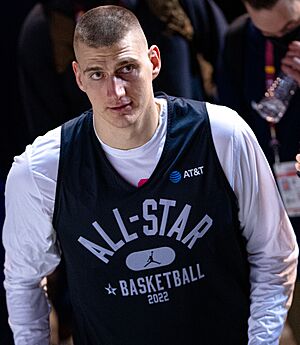
In June 2015, Michael Malone became the new head coach. The Nuggets drafted Emmanuel Mudiay. They also traded Ty Lawson, who had faced personal challenges off the court, to the Houston Rockets.
Under Coach Malone, the Nuggets slowly improved. They relied on young players like Mudiay, Nikola Jokić, and Gary Harris. In 2016, Jokić and Mudiay played in the Rising Stars Challenge during the NBA All-Star weekend. In 2017, Nurkić was traded to the Portland Trail Blazers. Thanks to Jokić's continued improvement, the Nuggets got much better. They just missed the playoffs in 2017, finishing ninth in the Western Conference.
In 2017, the Nuggets retired Fat Lever's number. In 2018, they had their first winning season since 2013. However, they missed the playoffs again after losing a final game to the Minnesota Timberwolves.
Rise of Nikola Jokić (2018–2020)
In 2018, the Nuggets drafted Michael Porter Jr.. In January 2019, Jokić was selected for his first All-Star Game. He was the Nuggets' first All-Star since Carmelo Anthony in 2011. The Nuggets finished the 2018–19 season with 54 wins, first in their division and second in the Western Conference. They made the playoffs for the first time since 2013.
They beat the San Antonio Spurs in seven games in the first round. They then lost to the Portland Trail Blazers in seven games in the second round. One game in that series went into four overtimes, tying an NBA playoff record.
In 2020, the NBA season was paused due to a global event. When it restarted in the "NBA Bubble," the Nuggets, led by Jokić and Murray, made history. They became the first team in NBA playoff history to come back from a 3–1 deficit twice in the same playoffs. They beat the Utah Jazz and then the Los Angeles Clippers in seven games each. Their amazing playoff run ended in the Western Conference Finals, where they lost to the Los Angeles Lakers.
Jokić Wins Back-to-Back MVP Awards (2020–2022)
In the 2020–21 season, Nikola Jokić was named the NBA Most Valuable Player. He was the first player in Nuggets history to win this award. He also became the lowest-drafted player ever to win MVP. The Nuggets finished third in the Western Conference and beat the Portland Trail Blazers in the first round. However, they lost starting guard Jamal Murray to a serious knee injury. This contributed to them being swept by the Phoenix Suns in the next round.
The 2021–22 season also saw many injuries. Michael Porter Jr. had season-ending back surgery. Despite the injuries, Jokić and Aaron Gordon led the Nuggets to the sixth seed. Jokić became the first player in NBA history to get 2,000 points, 1,000 rebounds, and 500 assists in one season. He won the MVP award for the second year in a row! In the playoffs, the Nuggets lost to the Golden State Warriors.
First NBA Title (2022–2023)
In the 2022–23 season, the Nuggets added Kentavious Caldwell-Pope and Bruce Brown. They secured the top spot in the Western Conference with 53 wins. In the 2023 playoffs, they defeated the Minnesota Timberwolves and then the Phoenix Suns.
The Nuggets continued their amazing playoff run in the Conference Finals. Led by an outstanding performance from Jokić, they swept the Los Angeles Lakers in four games. This was their first time ever beating the Lakers in a playoff series. It was also the first playoff series sweep in franchise history. On June 12, 2023, the Nuggets beat the Miami Heat 4–1 in the NBA Finals to win their first NBA championship! Jokić was named the NBA Finals MVP.
Dethroned and Jokić's Third MVP (2023–2024)
The 2023–24 season was the first time the Nuggets played as defending champions. They finished second in the Western Conference with 57 wins. On May 8, 2024, Nikola Jokić won his third Most Valuable Player Award. He became only the ninth player in NBA history to do so. In the first round of the playoffs, the Nuggets beat the Los Angeles Lakers 4–1. Jamal Murray made several game-winning shots in that series. In the next round, the Conference Semifinals, they faced the Minnesota Timberwolves. The Nuggets were leading by a lot in Game 7, but the Timberwolves made a comeback and won, ending Denver's championship defense.
Malone Era Ends (2024–2025)
In the 2024 NBA draft, the Nuggets traded for DaRon Holmes II. However, he suffered a serious injury in the NBA Summer League. The Nuggets also signed former MVP Russell Westbrook. They lost a key player, Kentavious Caldwell-Pope.
On April 8, 2025, the Nuggets fired head coach Michael Malone and general manager Calvin Booth. In the 2024–25 season, Denver finished fourth in the Western Conference. They beat the Los Angeles Clippers in seven games in the first round of the playoffs. A memorable moment was Aaron Gordon's game-winning dunk in Game 4. They then lost to the top-seeded Oklahoma City Thunder in seven games in the semi-finals. The Nuggets later hired their interim coach, David Adelman, as their official new head coach.
Recent Season Records
Here are the results for the last five seasons.
| Season | GP | W | L | W–L% | Finish | Playoffs |
| 2020–21 | 72 | 47 | 25 | .653 | 2nd, Northwest | Lost in conference semifinals, 0–4 (Suns) |
| 2021–22 | 82 | 48 | 34 | .585 | 2nd, Northwest | Lost in first round, 1–4 (Warriors) |
| 2022–23 | 82 | 53 | 29 | .646 | 1st, Northwest | NBA champions, 4–1 (Heat) |
| 2023–24 | 82 | 57 | 25 | .695 | 2nd, Northwest | Lost in conference semifinals, 3–4 (Timberwolves) |
| 2024–25 | 82 | 50 | 32 | .610 | 2nd, Northwest | Lost in conference semifinals, 3–4 (Thunder) |
Home Courts
- Denver Auditorium Arena (1967–1975)
- Denver Coliseum (1967–1975)
- McNichols Sports Arena (1975–1999)
- Ball Arena (1999–present)
- formerly known as Pepsi Center (1999–2020)
Team Colors, Logos, and Uniforms
The Nuggets have changed their colors, logos, and uniforms many times throughout their history, including when they were the "Denver Rockets" in the ABA.
Denver Rockets (1967–1974)
From 1967 to 1971, the Rockets used black, orange, and white colors. From 1971 to 1974, they switched to gold and purple. Their logo showed a cartoon rocket bouncing a basketball with a snow-capped mountain in the background.
Maxie The Miner (1974–1982)
When the team became the Nuggets in 1974, their logo featured a cartoon miner named "Maxie The Miner." He had a red beard and held a pick-axe and a basketball. The team kept this pick-axe logo on their jerseys when they joined the NBA in 1976. The home jerseys were white with "Nuggets" in red. The away jerseys were blue with "Denver" in blue.
Rainbow City Skyline (1982–1993)
From 1982 to 1993, the Nuggets wore uniforms with a colorful "rainbow city" skyline design across the chest and back. Some fans called it the "Tetris" logo because of the square-shaped buildings. The home uniforms were white, and the away uniforms were navy blue. Over time, they changed the shades of blue and gold. This "skyline" logo was brought back on special alternate jerseys starting in 2012.
For the 1993–94 season, the Nuggets completely changed their look. They used navy blue, metallic gold, and maroon. The "rainbow city skyline" was replaced with a new logo. This logo showed a navy blue mountain above a large "Nuggets" wordmark. The home jerseys had "Nuggets" in navy blue, and the away jerseys had it in metallic gold. They wore these uniforms for ten years.
In 2003, when Carmelo Anthony joined, the Nuggets changed their uniforms again. The new colors were powder blue, gold, and royal blue. The mountain logo was updated with these new colors. The jerseys had "Nuggets" on the home white ones and "Denver" on the powder blue away ones. In 2008, the royal blue was changed to navy blue.
In 2005, the Nuggets added an alternate logo with two pick-axes in a circle. They also introduced an alternate navy blue uniform. This circular "pick axe" logo later became the team's main logo in 2018.
For the 2012–13 season, the Nuggets brought back a gold alternate jersey. This jersey featured the "rainbow skyline" logo but used the team's newer colors. In 2015, they updated the fonts on their jerseys. In 2017, Nike became the uniform supplier. Navy blue became a main color again, and powder blue was used less.
Evolved New Identity (2018–Present)
For the 2018–19 season, the Nuggets updated their logos and uniforms again. The current colors are midnight blue (navy), sunshine yellow, flatirons red (maroon), and skyline blue (royal). Powder blue was removed. The white "Association" jersey has "Nuggets" in red. The midnight blue "Icon" jersey has "Denver" in yellow. Both have mountain peak designs on the shorts. The skyline blue "Statement" jersey says "Mile High City" in white. The circular "pick axe logo" became the team's main logo.
In 2022–23, the "Statement" uniform was slightly changed, adding more gold and red.
City Edition Uniforms
Since 2017, Nike has released special "City" uniforms each year.
- 2017–18: Navy blue with a pick-axe and mountain logo.
- 2018–19 & 2019–20: A callback to the 1980s rainbow uniforms, with a sublimated rainbow pattern. The 2019–20 version had a black base.
- 2020–21: Similar design but with a red/yellow/orange gradient in the mountains.
- 2021–22: A "mashup" uniform for the NBA's 75th anniversary. It combined elements from many past uniforms, including the rainbow, Maxie the Miner, and different logos.
- 2022–23: White uniforms inspired by Denver's architecture, with navy letters and colorful stripes.
- 2023–24: Black-based uniform with blue lines representing the Rocky Mountains and "5280" in gold, symbolizing Denver's high elevation.
- 2024–25: White-based uniform bringing back the "Rainbow" theme and "5280" text.
Earned Edition Uniforms (2020)
As a reward for making the playoffs, the Nuggets received a special "Earned" uniform in the 2020–21 season. This white uniform featured a modified pickaxe logo with skyline blue and flatirons red.
Team Mascot
Rocky The Mountain Lion has been the official team mascot since the 1990–91 season. He is known for being one of the highest-paid mascots in the NBA.
Retired Numbers
The Nuggets have honored several important players and a coach by retiring their jersey numbers. This means no other player on the team will wear that number again.
| Denver Nuggets retired numbers | ||||
|---|---|---|---|---|
| No. | Player | Position | Tenure | Date |
| 2 | Alex English | F | 1980–1990 | March 2, 1993 |
| 12 | Fat Lever | G | 1984–1990 | December 2, 2017 |
| 33 | David Thompson | F/G | 1975–1982 | November 7, 1992 |
| 40 | Byron Beck | F/C | 1967–1977 | December 16, 1977 |
| 44 | Dan Issel | C/F | 1975–1985 | April 5, 1985 |
| 55 | Dikembe Mutombo | C | 1991–1996 | October 29, 2016 |
| 432 1 | Doug Moe | Head coach | 1980–1990 | November 7, 2002 |
Notes:
- 1 The number 432 represents the total number of regular season victories Doug Moe had as the Nuggets' coach.
- The NBA retired Bill Russell's No. 6 for all its teams on August 11, 2022.
Basketball Hall of Famers
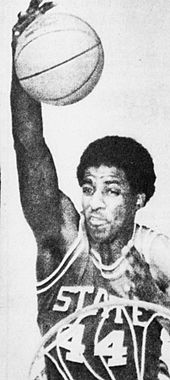
Many players and coaches who were part of the Denver Nuggets have been inducted into the Naismith Memorial Basketball Hall of Fame. This honor recognizes their amazing careers in basketball.
| Denver Nuggets Hall of Famers | ||||
|---|---|---|---|---|
| Players | ||||
| No. | Name | Position | Tenure | Inducted |
| 25 44 |
Dan Issel | C/F | 1975–1985 | 1993 |
| 33 | David Thompson | F/G | 1975–1982 | 1996 |
| 2 | Alex English | F | 1980–1990 | 1997 |
| 8 | Šarūnas Marčiulionis | G | 1996–1997 | 2014 |
| 24 | Spencer Haywood | F/C | 1969–1970 | 2015 |
| 55 | Dikembe Mutombo | C | 1991–1996 | 2015 |
| 3 | Allen Iverson | G | 2006–2008 | 2016 |
| 30 | George McGinnis | F | 1978–1980 | 2017 |
| 11 | Charlie Scott | G | 1978–1980 | 2018 |
| 24 | Bobby Jones | F | 1974–1978 | 2019 |
| 10 | Tim Hardaway | G | 2002 | 2022 |
| 6 | Walter Davis | G/F | 1988–1991 1991–1992 |
2024 |
| 1 4 7 |
Chauncey Billups | G | 1999–2000 2008–2011 |
2024 |
| 15 | Carmelo Anthony | F | 2003–2011 | 2025 |
| Coaches | ||||
| Name | Position | Tenure | Inducted | |
| Alex Hannum | Head coach | 1971–1974 | 1998 | |
| 11 | Larry Brown | Head coach | 1974–1979 | 2002 |
| John McLendon | Head coach | 1969 | 2016 | |
| George Karl | Head coach | 2005–2013 | 2022 | |
See also
 In Spanish: Denver Nuggets para niños
In Spanish: Denver Nuggets para niños
 | James Van Der Zee |
 | Alma Thomas |
 | Ellis Wilson |
 | Margaret Taylor-Burroughs |


